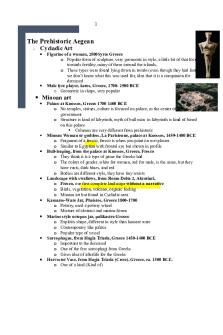CM ELIOT - Originality Through Tradition, Temporal History In Eternal time PDF

| Title | CM ELIOT - Originality Through Tradition, Temporal History In Eternal time |
|---|---|
| Author | LAËTITIA MESNAGE |
| Course | Littérature (L5ANLIT) |
| Institution | Sorbonne Université |
| Pages | 2 |
| File Size | 45.2 KB |
| File Type | |
| Total Downloads | 42 |
| Total Views | 120 |
Summary
CM 4 ELIOT - Originality Through Tradition, Temporal History In Eternal time...
Description
ORIGINALITY THROUGH TRADITION, TEMPORAL HISTORY IN ETERNAL TIME
2 aspects of temporality and time in Eliot’s poetry :
The timeless and eternal time out of time
Temporal history in time
What Eliot calls the historical sense is the temporal and the timeless together: what exist in time and out of time is in constant interaction. We have a mechanical conception of times: we divide time into segments, completely artificial: minutes, hours do not exist in reality. They are human constructions. “Clock time”. ≠ Famous concept of Duration: it is time experienced by the subject, the individual. All the individual perceptions of time. Instead of reducing time to its mechanical conception, Bergson wants to keep time subjective. Disagreement between Bergson and Eliot: Bergson says that we experience time as an invisible duration. ≠ Eliot says that time must always be replaced and compared with something timeless. He argues that in order to perceive time itself, god must exist. It must be something out of time which allows us to see time. The second occurrence of the term “present” has 2 ≠ meanings - It exists (le verbe etre, etre present) - The present time itself In one world, we have 2 ≠ meanings. Not only the past influences the present, but also the present influences the past. How can we understand the reality of the past and the reality of future considering that these times are simply pure projections of the mind? Living in the present moment means that everything in the past is lost. Les phrases que le prof vient de dire n’existent plus désormais.
Question: Should poetry order the world or simply reflect disorder? Paradoxical dance, a dance without time other paradox: Movement without movement, dance without time. To be without time is to be without suffering, without desire, without thoughts. It is not the problem of time with Eliot, but the problem of the present: if we live in the present, we live in the psycho of want, of constant desiring. In the Waste Land, the notion of time constantly appears.
It doesn’t matter to Eliot where he was born, what is important is to close the cycle, to return to the place of departure. But this place must be changed. The crucial change is the change of the knowledge. Sort of physical determinism: everything is determined in advance, free will does not exist. At the end of my life, whatever the choices I made, I will be at the beginning again, because life is a cycle. To return to the question of time: It is only thanks to a notion of eternity that we can hope to understand temporality attack on Bergson, who says that we can experiment time without referential. Eliot almost argues that God must exist. The existence of God is proved by the existence of temporality. The difficulty of attaining this state, this state of present, is caused by the accumulation of the past. The accumulation of the past means that experiencing the present is difficult: felling of being crushed by past traditions. Even if Eliot makes the past the point of his originality, these past traditions are still crushing At the beginning of life, there are less memories, there is less experience, so it is more easy to live the intense moments, with no before and after. But as one’s ages, one is confronted with the constant problem of memory confronting with past, it is difficult to even experience the present, to experience the temporality. If you have 60 years old, the intense accumulation of moments means that the moment itself can not be lived as easily. The pb is not the accumulation of the past, but also the accumulation of all the human lives past of history. Question of the past and of memory in Eliot’s poetry is very important . How to live in that temporal accumulation? Final paradox: we must be still and still moving. -Still as “encore” - Still as “sans movement”, “stillness” He tries to bring together this two pole. Idea of stillness in movement. In time is always understood as out of time, and vice versa....
Similar Free PDFs

Medicine Through Time Timeline
- 6 Pages

Tradition in The Lottery
- 8 Pages

Temporal Fossa Infra temporal fossa
- 18 Pages

Viewing an originality report
- 2 Pages

Hope Spring Eternal
- 3 Pages

Just in time administración
- 10 Pages
Popular Institutions
- Tinajero National High School - Annex
- Politeknik Caltex Riau
- Yokohama City University
- SGT University
- University of Al-Qadisiyah
- Divine Word College of Vigan
- Techniek College Rotterdam
- Universidade de Santiago
- Universiti Teknologi MARA Cawangan Johor Kampus Pasir Gudang
- Poltekkes Kemenkes Yogyakarta
- Baguio City National High School
- Colegio san marcos
- preparatoria uno
- Centro de Bachillerato Tecnológico Industrial y de Servicios No. 107
- Dalian Maritime University
- Quang Trung Secondary School
- Colegio Tecnológico en Informática
- Corporación Regional de Educación Superior
- Grupo CEDVA
- Dar Al Uloom University
- Centro de Estudios Preuniversitarios de la Universidad Nacional de Ingeniería
- 上智大学
- Aakash International School, Nuna Majara
- San Felipe Neri Catholic School
- Kang Chiao International School - New Taipei City
- Misamis Occidental National High School
- Institución Educativa Escuela Normal Juan Ladrilleros
- Kolehiyo ng Pantukan
- Batanes State College
- Instituto Continental
- Sekolah Menengah Kejuruan Kesehatan Kaltara (Tarakan)
- Colegio de La Inmaculada Concepcion - Cebu









